Tag Archives: quantum computing
Quantum machine learning: Concepts and Examples
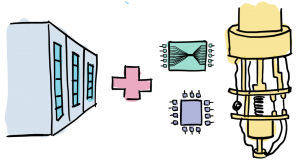
Machine learning has been a hot topic for many years now. There are different types of machine learning algorithms that data scientists and engineers use in their projects, depending on the type of problem they’re trying to solve. Recently, quantum machine learning has emerged as an alternative to classical machine learning techniques. The future of quantum computing holds tremendous possibilities promising exponential speedups over current technology. In this blog post, we’ll explore quantum machine learning (QML), its benefits over traditional machine learning methods, and the common quantum computing concepts it relies on. What are key concepts related to quantum computing? Quantum computing takes advantage of the computing power available through …
Quantum Superposition States Explained with Examples
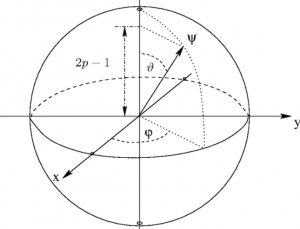
Qubit (Quantum Bit) is the fundamental unit of information in quantum computing as like bit which is the basic unit of information in classical computing. However, unlike bit in the classical computing which can exist in one of two states such as 0 and 1 at any given point of time, the qubit can be found to exist in states 0, 1 or the superposition state which, simply speaking, can be said to be both 0 and 1. In this post, you will learn some of the following: Qubit and Superposition State Superposition state explained with examples Qubit and Superposition State The following are some of the important points about …
Quantum Computing – Two Ways to Install QISKit on Linux
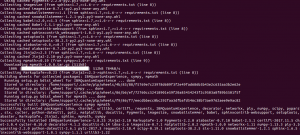
This article represents different ways in which you can go about installing Quantum Information Science Kit (QISKit) on Linux and related distros such as Ubuntu. QISKit is software development kit (SDK) for writing quantum computing experiments, programs, and applications. In this post, you will learn about some of the following topics in relation to installing QISKit on Linux: Install QISKit using PIP Install QISKit from Github repository Install QISKit using PIP You can go about installing QISKit using PIP, a Package manager for installing python libraries. The catch here is the requirement of using Python 3.5. or later. Often, we have python 2.7. setup as a default python alternative for …
Quantum Computing – How to Install QISKit using PIP
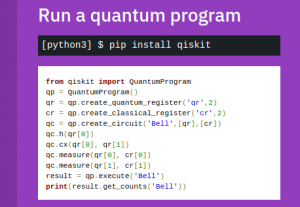
This article represents instructions and related concepts on how to install QISKit (Quantum Information Science Kit) using PIP. As per Wikipedia Page on PIP, PIP is a package management system used to install and manage software packages written in Python. This article assumes that you are working with Linux distributions (distros) OS such as Ubuntu etc. The following topics are discussed in this article: What is QISKit Install Python PIP Install QISKit using PIP Install Command Test First Quantum program What is QISKit? QISKit is a software development kit (SDK) comprising of Python-based software libraries that can be used to create quantum computing programs, compile them, and execute them on one of …
QISKit and IBM-QX for Running Quantum Computing Applications
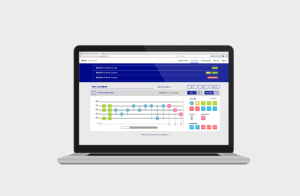
IBM-Q is IBM’s initiative to build commercially available universal quantum computers for business and science. IBM-Q currently recommends using QISKit and Quantum Composer for building quantum computing experiments, programs and applications which could run on real quantum computing hardware provided by IBM cloud. The details on how to get started with building and running Quantum applications can be provided on IBM’s website, IBM Q Experience (IBM-QX). In this article, let’s look at further details in relation with QISKit SDK. QISKit SDK for building Quantum Computing applications IBM-Q recommends Python software development kit (SDK) namely Quantum Information Software Kit (QISKit) which can be used for building programs, applications that could run on IBM quantum computers (quantum computing hardware). Here are some reference links: Github page on QISKit: COnsists …
Great Quantum Computing Tutorials from DWave System
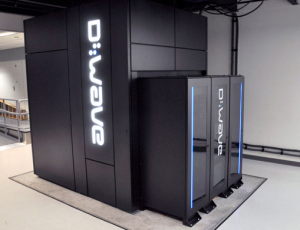
I have been watching several quantum computing tutorial videos on YouTube and Ted, and, reading multiple web pages to find out one or more videos / documents which could make it easier for anyone to understand quantum computing and related concepts. This is where I landed on this document Quantum Computing Primer by DWave Systems. The following are some of the document highlights: Explained quantum computing concepts such as qubits being in superposition of states using light switches with ON and OFF states with reference to both classical and quantum computing. The following is the most interesting part of Qubits explanation: You start with the system in its quantum superposition …
Quantum Computing Interview Questions and Answers – Set 1
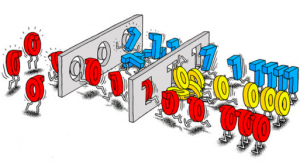
This is the first in series of practice tests / interview questions and answers in relation to Quantum computing. It touches upon the basic concepts in relation to some of the following: Qubit Difference between a bit and Qubit Superposition of Qubit states Quantum entanglement This practice test will prove to be useful for Quantum Computing beginners / interns / freshers. Revision Notes – Quantum Computing Fundamentals Quantum computing is different than classical computing. Problems which are suited for quantum computing should be considered for Quantum computing. A Qubit is a two-state quantum mechanical system; A Qubit can be in superposition of both the states at the same time. A Qubit is similar to bit …
Quantum Computing and Syllabus Topics for Learning
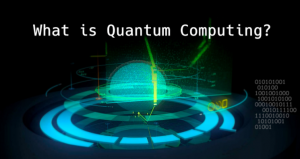
The following represents key elements of Quantum computing which needs to be emphasized during learning stages: Understanding of Bits and Qubits Fundamentals of Linear Algebra Quantum mechanics principles Quantum computation models Quantum Factoring Complexity theory Search algorithms Quantum computing applications These topics can form part of syllabus if you are planning to design a course on Quantum computing. Understanding Qubits vs Bits Coming from a traditional classical computing background, it would be important to understand some of the following: What are Qubits? How does Qubit relates to Bits? Introduction to Superposition and Entanglement concepts Qubits examples Linear Algebra Fundamentals Given the state space of a quantum system is described in …
Free Books / Lecture Notes on Quantum Computing

This page represents a list of popular / top / free books and lecture notes on Quantum Computing. This page will be updated from time-to-time. Please feel free to suggest any good books on Quantum Computing that can be added to the list given below: Quantum Computation and Quantum Information: This book is authored by Michael A. Nielsen, Isaac L. Chuang. Interestingly, Michael A. Nielsen has also a free online book on Neural Network and Deep Learning. Worth a visit on his pages. Classical and Quantum Computation by Alexei Yu. Kitaev, Alexander Shen, Mikhail N. Vyalyi. Here is a page listing down work of Alexei Kitaev on Quantum Computing. Here is a page listing down other work of Mikhail Vyalyi. Quantum …
Dummies – How to Start Learning Quantum Computing

If you are a beginner / rookie / fresher to quantum computing and wondering on how to get started with Quantum Computing, here is the great piece of advice on learning Quantum Computing, posted by Aram Harrow, assistant professor of Physics at MIT. The following is the summary: Quantum computing is at the intersection of Mathematics, Physics and Computer Science. Given above information, get started with learning some of the following: Physics (Quantum mechanics) Mathematics (Linear Algebra and Probability). Other topics may include group and representation theory, random matrix theory and functional analysis. Computer Science topics including but not limited to algorithms, cryptography, information theory, error-correcting codes, optimization, complexity, machine learning Quantum Computing Bookmarks You may bookmark some …
Top 12 US Universities for Quantum Computing Research

Here is the list of top 12 US Universities where quantum computing research is going on. This list will be updated from time-to-time. Please feel free to suggest. MIT – Quantum Information and Integrated Nanosystems: This group is doing applied research and prototype demonstrations that draw upon a broad foundation of innovative device design, outstanding fabrication tools, and well-equipped measurement infrastructure. University of Berkeley – Berkeley Quantum Information & Computation Center University of Chicago – Chicago Quantum Exchange: The following are some of the research areas: Condensed Matter Physics Atomic, Molecular, and Optical Physics Physical Chemistry Quantum Information Quantum Optics Quantum Sensing Nanomechanics Topological Physics Device Physics UC Santa Barbara: The following is a list …
20+ Usecases in Quantum Computing
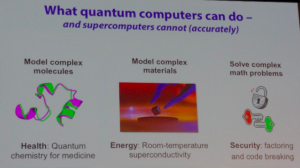
Here is a list of 20+ Quantum Computing Use Cases in some of the following fields: Machine Learning and Computer Science Financial Modeling Healthcare and medicine Security and mission planning Machine Learning and Computer Science Detecting statistical anomalies Finding compressed models Recognizing images and patterns Training neural networks Verifying and validating software Classifying unstructured data Diagnosing circuit faults Financial Modeling Detecting market instabilities Developing trading strategies Optimizing trading trajectories Optimizing asset pricing and hedging Optimizing portfolios Healthcare and Medicine Detecting fraud Generating targeted cancer drug therapies Optimizing radiotherapy treatments Creating protein models Security and Mission Planning Detecting computer viruses & network intrusion Scheduling resources and optimal paths Determining set membership …
Top 6 Quantum Computing Companies to Follow in 2018
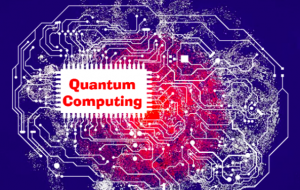
Here is the list of top 6 companies (and related pages) to watch out in quantum computing space in the year 2018 and later. You would want to bookmark the pages given below in order to follow their work in the area of quantum computing from time-to-time. D-wave: D-Wave quantum computers are based on superconducting processor that uses quantum mechanics to massively accelerate computation. Here is the link to technology overview of their quantum computer. Rigetti: Rigetti is building hardware and software with fundamentally new integrated circuits that store and process quantum information. IBM Quantum Computing: IBM is on the forefront of quantum computing and they are making their quantum …
I found it very helpful. However the differences are not too understandable for me